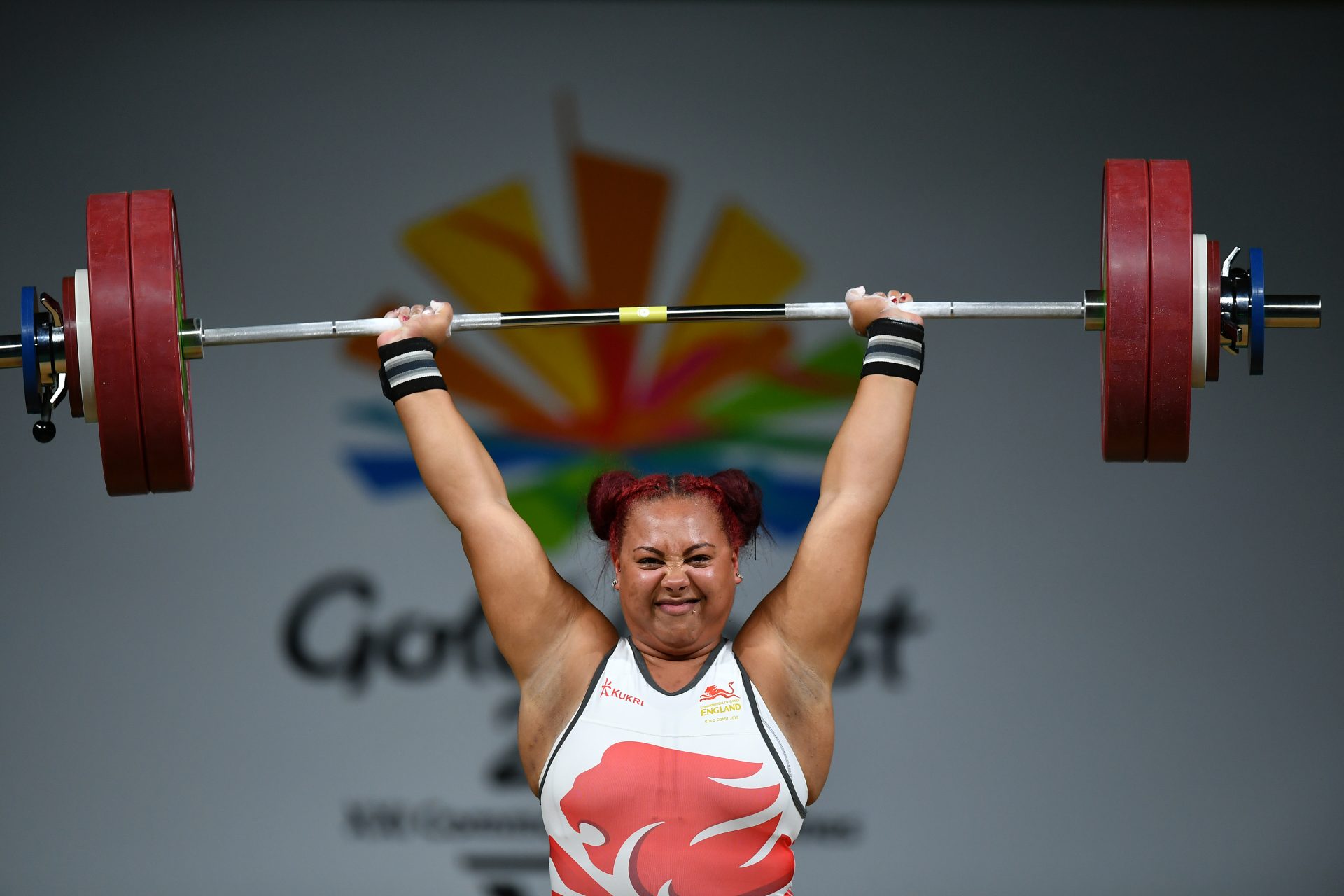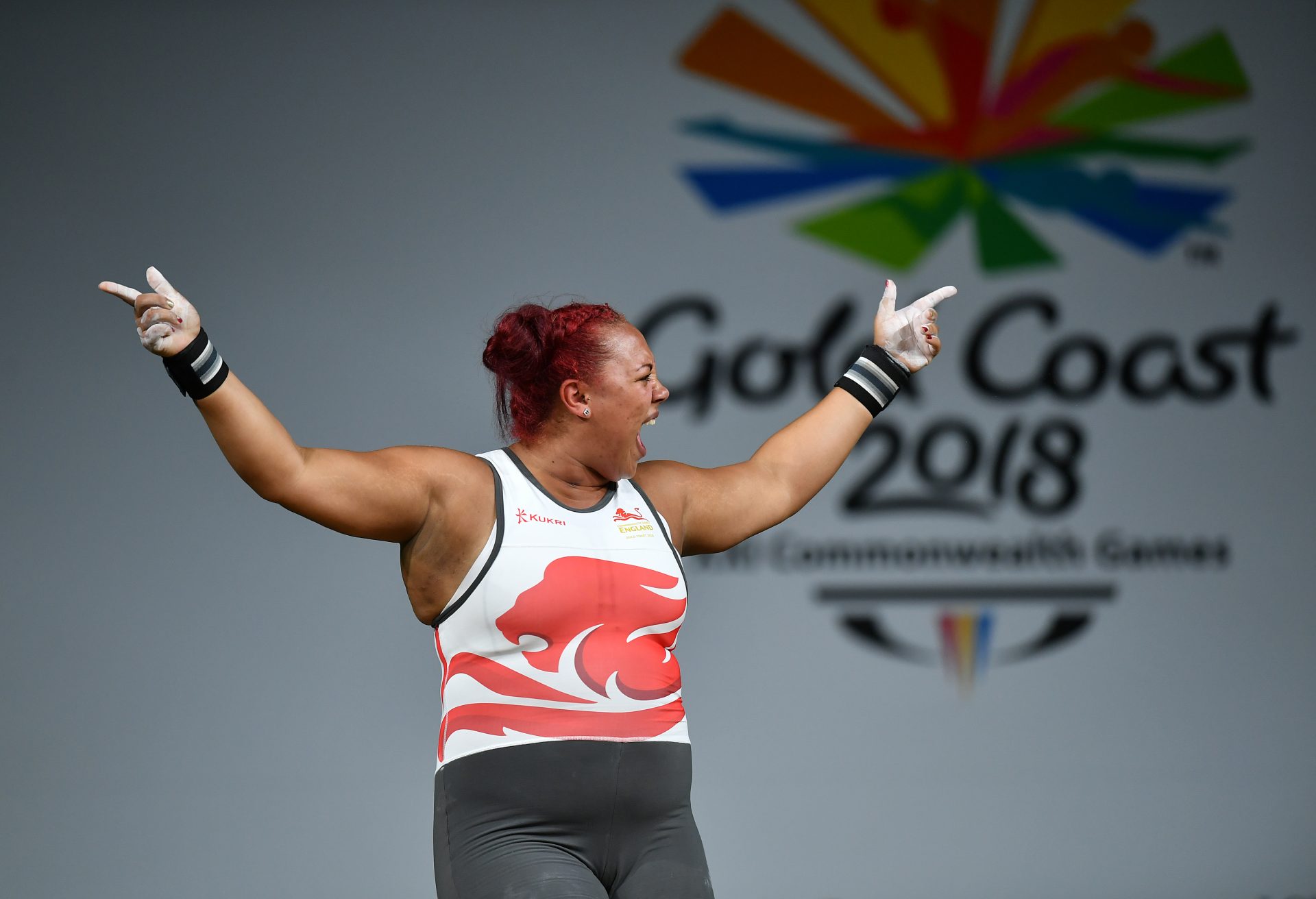“I was in tears”: The true meaning of Emily Campbell’s weightlifting success
Team GB’s Emily Campbell has won a silver medal at Tokyo 2020, but her success means more to women who weightlift.
Emily Campbell is an unexpected Olympian. That only serves to make the silver medal she took home in weightlifting (the first woman to ever win a medal in the sport for Team GB) even more inspiring.
She snatched and clean and jerked to a total of 283kg to place second in the competition, lifting only 1kg more than Team USA’s Sarah Robles who took home bronze. But Campbell was remarkable for more than the weight she lifted. She’d only touched a barbell for the first time five years ago, aged 22. She’d had sponsors pull out because of her clothing size, and she’d overcome a recurring knee injury to squat and jerk huge figures. The odds were stacked against her. And yet… she got to stand on the podium.
You may also like
Tokyo 2020: why Simone Biles is the quitspiration we all need for protecting our mental and physical health
Campbell’s success isn’t just about adding more metal to Team GB’s trophy cabinet. Having previously told the BBC that a big part of her motivation was “to prove that women who look like me can have successful careers in sport”, she’s become a homegrown hero in less than 24 hours since her lift. And women in weightlifting are particularly excited about what her success might mean for them and their sport.
“It was a pinnacle moment for inclusivity and representation in weightlifting”
Jenny Tong works closely with Campbell in her role as non-executive director of British Weightlifting. “We’ve been together through campaigning for Black Lives Matter and trying to push forward the message of inclusivity,” Tong says. “Emily really embodies everything there is about the athletes spirit and diversity in sport. Even more than just being a Black and bigger woman, she really owns her identity. Any medal for Team GB would have been amazing – but for Emily to be the one in the spotlight feels like a really huge moment for women.”

The reason Tong feels so strongly about having Emily’s work rewarded is because she has long been on a trail to prove weightlifting is for anyone. While there’s been an increase in attention in women’s weightlifting in recent years, she doesn’t think it’s reached as far as it could have. “I imagine from the outside, it seems like a very niche sport that a lot of people don’t necessarily have access to. We’re hoping that witnessing participants like Emily dominate the international stage will make people see that they are the potential future champions, even if they didn’t think they ever had it in them.
“While lifting is an individual sport, it’s a huge community with incredible support groups and we want everyone to know that they can achieve it regardless of their background. Emily proved she’s more than just an incredible athlete – you can see just from her presence on the stage that she is a character, and that is a fantastic representation of our community.”
You may also like
Future of fitness: 4 women explain how they want gyms to change
“It’s hard to articulate how incredibly inspiring I find her”
“As soon as I found out that Emily was lifting, I had it in my diary. I watched it with my five year old son and we screamed and wailed. I am elated for her,” says comedian, host of the Hoovering podcast and weightlifter Jessica Fostekew. Having taken up weightlifting six years ago, she’s first hand seen the shift in attitudes towards women in the gym. “My hope is that it’s partly, at least, a result of how increasingly welcome women feel in weightlifting spaces. They’re not (all) the ridiculous sausage parties they used to be.”
Seeing Campbell is only going to compound that, says Fostekew. “Women have had centuries of being told to be small and quiet and lifting really flips the bird to that idea. It’s the completely literal way of empowerment, getting physically stronger. And now that women are increasingly feeling confident to try lifting, as a sport, it’s unsurprising that they’re realising how much confidence and pleasure there is to be gained from doing it. Emily’s made weightlifting look as cool as it’s possible to make any sport look – with her badass hair and her trademark steel-faced look- and I hope it means more women feel bold enough to give it a pop if they think it’s something they might enjoy.”
Fostekew herself is going to compete in her first lifting competitions, inspired by the likes of Campbell on the world stage. “Why not? I think the older I get the less pride I have in the sense that I don’t care if I make a tit out of myself. Yet conversely I have more pride in what my big, strong (not young) body can do and I’m keener than ever to take on challenges, push my body and see how strong and fit I can get.”
You may also like
Bethany Shriever: the most important part of the BMX gold medal win in Tokyo
“She’s proof that athleticism doesn’t have an end point”
“My friends were sending me videos and updates of her lifts and I just thought she was incredible,” says Samatha Williams, weightlifting coach and physiotherapist. “The fact that she had surgery on her knee not long ago and she was able to come back and not only hit her numbers, but hit more, is inspiring enough. That’s without the medal on top of it.”
Williams thinks that Campbell’s success is proof we need to change the way we think about being a beginner. “She shows that you can get into a sport like weightlifting at any time in your life. While Emily isn’t old – she’s 27 – she’s not in her teens or early 20s, the age everyone previously believed was the prime for athleticism. What we’re seeing more and more in sports like weightlifting is that women actually perform better when they are slightly older, and actually last for longer than a lot of men do.”
You may also like
5 life lessons from 74-year-old weight lifter and fitness influencer Joan McDonald
Plus, Williams thinks it’s important to see women dominate outside of traditionally feminine sports. “Women have always had a presence in track and field and some team sports like volleyball. But weightlifting has always been seen as predominantly a men’s sport, and it’s so important to see women doing the things that aren’t seen as glamorous and being recognised for the pure strength it takes.”

“People are there to see what you do as an athlete, not what you look like as an athlete”
“Emily’s made history by getting the medal, but she’s really leading the way for other women. It feels phenomenal to be in strength sports at the moment,” says Farah Fonesca, three times England’s Strongest Women and women’s health coach.
Campbell’s impact is already being seen, says Fonesca. “Look at her Instagram page – she’s already had a big jump in followers.” But it all leads on from the “increase in interest in women wanting to feel strong for themselves that I’ve seen as a coach in the industry over the past few years.
You may also like
Tokyo 2020: Team GB rower Helen Glover shares an inspiring message about “taking chances” after making Olympic history
“For a lot of women there’s social pressure in what you look like, even in sport. But in strength competitions there’s such an array of different women. Our confidence comes from knowing it’s about what we do and how we perform rather than what we look like.”
For Fonesca, having that message shared far and wide is the most powerful message for recreational and professional sports women, and it could change people’s motivations for getting into sport. “It’s really important for all women to have aspirational people on the world stage who look just like them.”
Images: Getty
Source: Read Full Article


